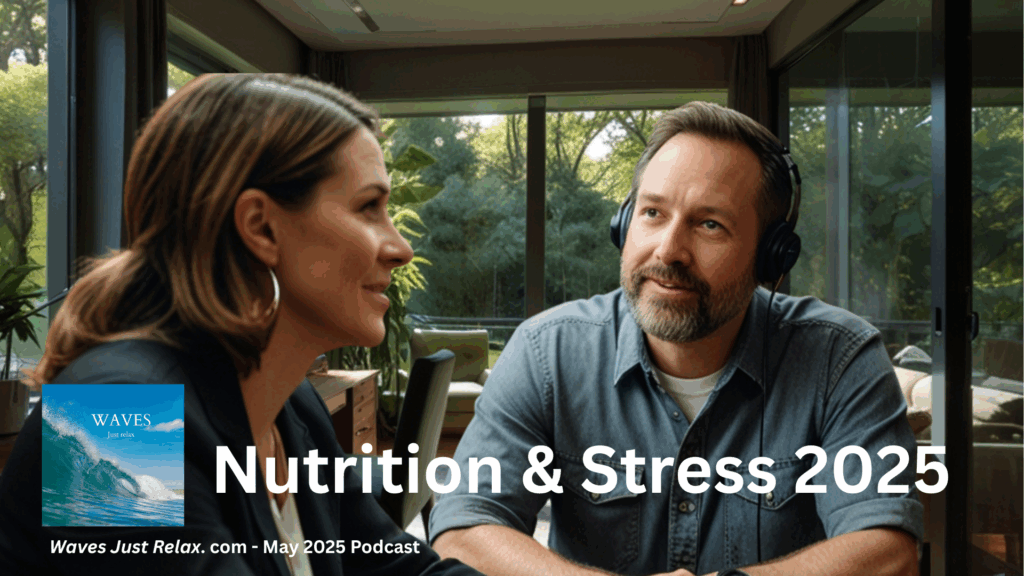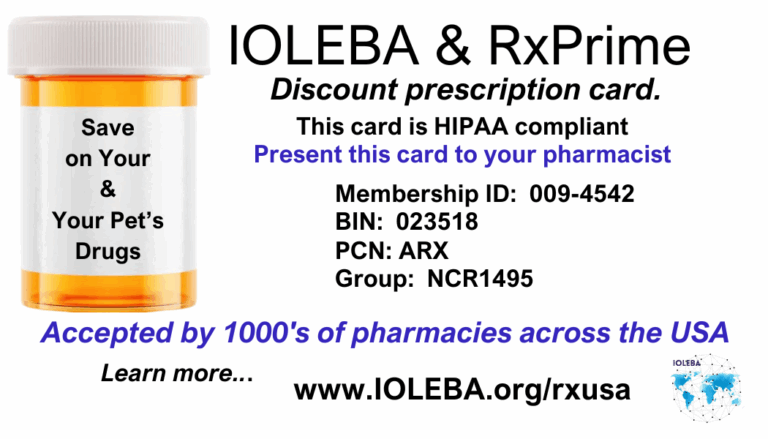
Waves Just Relax
NEWSLETTER
May 2025
Nutrition & Stress
Click the picture to the right or below in order to listen to our May Podcast. Our May 2025 focus is on nutrition and stress. Catch up on the latest information on this subject we have gathered.
Feature article…
Nutrition and Stress: How What You Eat Shapes How You Feel
Nutrition and Stress: How What You Eat Shapes How You Feel
If you’ve ever reached for a chocolate bar after a tough day or found yourself craving comfort food when life feels overwhelming, you’re not alone. The connection between what we eat and how we feel is more powerful than most of us realize. In recent years, a new field called “nutritional psychiatry” has emerged, led by experts like Dr. Drew Ramsey, MD, and it’s changing the way we think about food, stress, and mental well-being.
The Modern Brain Under Siege
Our brains are up against more than just the daily grind. According to Dr. Drew Ramsey, a psychiatrist and nutritional neuroscience pioneer at Columbia University, the modern world is full of hidden forces that can sabotage our focus, mood, and mental energy. From processed foods and environmental toxins to social disconnection and chronic stress, today’s challenges are unlike anything our ancestors faced. The result? Rising rates of anxiety, depression, and burnout, with many of us feeling foggy, frazzled, or just not quite ourselves.
But there’s good news: the latest research shows that what we put on our plates can help us fight back. Food isn’t just fuel—it’s one of the most powerful tools we have for building resilience, clarity, and joy.
The Science of Stress and Nutrition
Let’s start with the basics. Your brain, though it weighs only about three pounds, uses a whopping 20% of your daily calories. That’s about 500 calories a day just to keep your mind humming along. These calories aren’t just for thinking—they’re needed for everything from maintaining your heartbeat to regulating your mood. The nutrients you eat help build neurotransmitters (the brain’s chemical messengers), support nerve function, and even influence how you respond to stress
When stress hits, your body releases hormones like cortisol and adrenaline. In small doses, these hormones help you react quickly—think of the “fight or flight” response. But chronic stress, the kind that lingers for weeks or months, can wreak havoc on your body and mind. It can lead to inflammation, disrupt your sleep, and even change the way your brain works.
Here’s where nutrition comes in. Certain foods can help buffer the effects of stress, while others can make things worse. For example, diets high in processed foods, sugar, and unhealthy fats have been linked to higher rates of depression and anxiety. On the flip side, diets rich in whole foods—think leafy greens, nuts, beans, seafood, and colorful fruits—are associated with better mood, sharper thinking, and greater resilience.
The Gut-Brain Connection
One of the most exciting discoveries in recent years is the “gut-brain axis.” Your gut is home to trillions of bacteria, collectively known as the microbiome. These tiny organisms don’t just help you digest food—they also produce chemicals that influence your mood and stress response. In fact, about 90% of your body’s serotonin (a key mood-regulating neurotransmitter) is made in the gut.
When you eat a diet rich in fiber, fermented foods, and a variety of plant-based ingredients, you help nourish your microbiome. This, in turn, can reduce inflammation, improve your mood, and make you more resilient to stress. On the other hand, diets high in processed foods and low in fiber can disrupt the microbiome, leading to more stress and worse mental health outcomes.
Real Stories, Real Change
Dr. Ramsey’s work is full of stories from people who have transformed their mental health by changing their diets. One patient, struggling with anxiety and low energy, started by adding more leafy greens and seafood to her meals. Within weeks, she noticed her mood lifting and her stress levels dropping. Another found that simply eating regular, balanced meals—rather than skipping breakfast and grabbing fast food for lunch—helped him feel more focused and less irritable.
These stories aren’t just anecdotes. Large studies have shown that people who follow a Mediterranean-style diet (rich in vegetables, fruits, whole grains, nuts, and olive oil) are less likely to develop depression and anxiety. In fact, one study found that participants who improved their diets saw a 35% reduction in their risk for major depression
The Power of Connection
It’s not just what you eat, but how you eat that matters. Dr. Ramsey often asks his patients if they eat alone or with others. Why? Because sharing meals is one of the most powerful ways to reduce stress and boost mental health. Eating together fosters connection, reduces feelings of isolation, and even helps regulate inflammation in the body
In our fast-paced world, it’s easy to eat on the go or in front of a screen. But making time for family meals, cooking with friends, or even enjoying a quiet meal by yourself (mindfully, without distractions) can be a form of self-care.
Small Changes, Big Impact
You don’t have to overhaul your entire diet overnight to see benefits. Dr. Ramsey recommends starting with a few simple steps:
– Add more greens: Leafy vegetables like kale, spinach, and arugula are packed with nutrients that support brain health.
– Eat more seafood: Fatty fish like salmon, sardines, and mackerel are rich in omega-3 fatty acids, which help reduce inflammation and support mood.
– Snack on nuts and seeds: Almonds, walnuts, chia seeds, and flaxseeds are great sources of healthy fats and minerals.
– Embrace beans and legumes: These are affordable, filling, and full of fiber to nourish your gut.
– Color your plate: The more colorful your fruits and vegetables, the more antioxidants and phytonutrients you’ll get.
And don’t forget the basics: drink plenty of water, get enough sleep, and move your body regularly. Even something as simple as dancing in your living room can boost your mood and help your brain grow new connections.
The Latest Research: What’s New in 2025
The field of nutritional psychiatry is moving fast. At the 2025 annual meeting of the American Society for Nutrition, experts highlighted new research on the links between diet, stress, and mental health. Some of the most promising findings include:
– The role of fermented foods (like yogurt, kimchi, and sauerkraut) in reducing anxiety and supporting gut health.
– How regular family meals can buffer the effects of chronic stress in children and adults.
– The impact of ultra-processed foods on brain inflammation and cognitive decline.
– The benefits of “nutritional interventions” (like adding more omega-3s or polyphenols) for people with high stress or mood disorders
Other experts, like Dr. Uma Naidoo at Harvard and Dr. Felice Jacka in Australia, are also leading the charge. Their research confirms that dietary changes can be as effective as some medications for mild to moderate depression—and that the earlier you start, the better.
Taking Action: Your Mental Fitness Plan
So, what can you do today to support your mental health through nutrition? Here’s a simple plan inspired by Dr. Ramsey and his colleagues:
1. **Start with one meal:** Pick one meal a day to make more nourishing. Maybe it’s adding spinach to your morning eggs or swapping chips for a handful of walnuts.
2. **Connect over food:** Invite a friend for lunch, cook with your kids, or join a community cooking class.
3. **Listen to your body:** Notice how different foods make you feel. Keep a “mood and food” journal for a week and see what patterns emerge.
4. **Be patient:** Change takes time. Celebrate small wins and remember that every step counts.
5. **Seek support:** If you’re struggling with stress, anxiety, or depression, don’t hesitate to reach out to a mental health professional. Many therapists and psychiatrists now incorporate nutrition into their treatment plans.
A New Way Forward
The message from the latest science is clear: food is more than just calories. It’s information for your brain, fuel for your mood, and a foundation for resilience. By making small, mindful changes to what and how you eat, you can take powerful steps toward a calmer, clearer, and more joyful life.
As Dr. Ramsey puts it, “Mental health awareness isn’t enough anymore. It’s time for mental health action.” So, the next time you’re feeling stressed, remember: your next meal could be the first step toward feeling better—body, mind, and soul.
Articles of Interest
The IOLEBA-RxPrime prescription savings card is HIPAA compliant. Your personal information is never sold, traded or given to ANYONE. Your personal privacy remains as important as saving money. This card works at over 10,000 pharmacies across the USA. We are working hard to expand drug discounts the same as we have done for over ten years.
…articles links continued…
Bayer Launches Training Program to Help Employees Better Support Stress
The Power Of Nutrition, Yoga and Meditation For Musicians – Hypebot
Adaptive dynamics of extrachromosomal circular DNA in rice under nutrient stress – Nature
Why weight loss requires fixing your morning ritual before age 40
How to boost fertility naturally: Do gentle exercises, banish stress, eat healthy to improve chances
From Skin To Sleep, This Is How Stress Impacts The Body By Age – Yahoo News Canada
101-year-old doctor reveals one secret to living beyond 100 years, and no, it is not food or …
7 Gut Health Myths GI Docs and Dietitians Really Wish You’d Stop Believing |
New study says better middle age eating habits can lead to a healthier 70 | KERA News
Coping With the Stress of a Move | Psychology Today
Nutritional interventions to counteract the detrimental consequences of early-life stress.
Why Your Gut Health Can Drive You Nuts – Celebrity Angels
A Nutritionist’s Tips to Improve Gut Health and Imbalances – Los Angeles Magazine
5 Ways In Which Junk Food Can Make You More Stressed | HerZindagi
Top 5 Ways to Naturally Boost Your Mood to Reduce Stress & Increase Dopamine
Seventy percent (70%) of American adults, that is 7 out of 10 use a daily prescription drug and 26% take 4 or more prescription drugs daily. Watch the IOLEBA May 2025 Podcast and how we are working with RxPrime to help Americans save money on their prescriptions. IOLEBA is a sister organization directly aligned to Wavesjustrelax. Learn more and begins saving on drug costs. IOLEBA is an organization providing free services and tools to on line entrepreneurs and small business owners.





